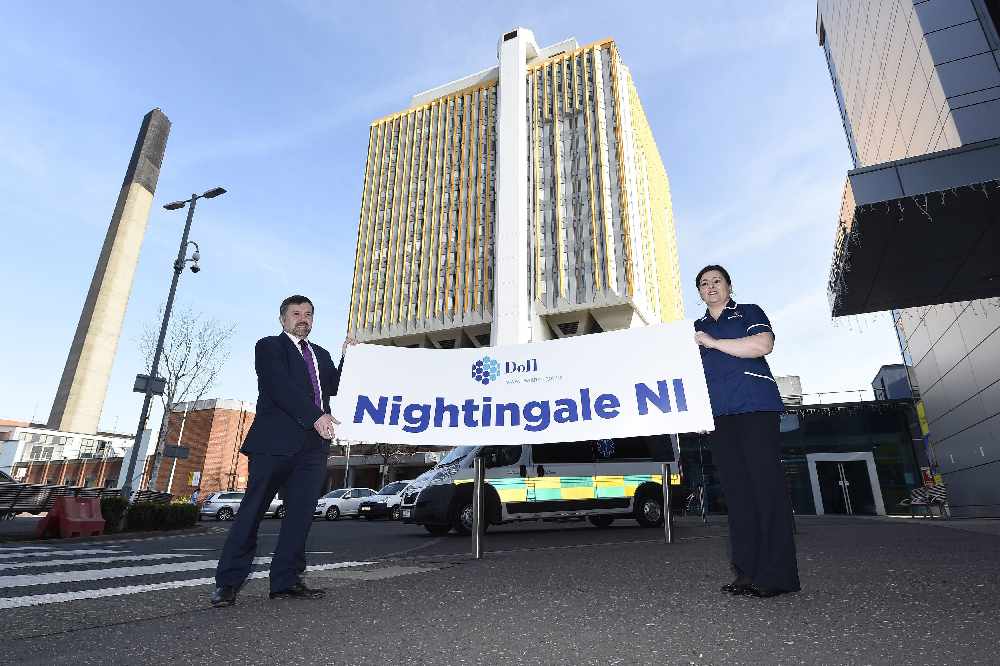
By Rebecca Black and Michael McHugh, PA
Health minister Robin Swann has criticised premises which flout coronavirus restrictions.
Mr Swann said he would be asking his ministerial colleagues on the Stormont Executive to prioritise “stronger legislation” to deal with the issue.
The minister was speaking after footage emerged which appeared to show guests at a wedding dancing at close quarters.
“I am concerned that some licensed premises are flouting the guidelines, guidelines that have been put in place to protect both customers and staff,” he said.
“I am hearing worrying reports from concerned members of the public and from the industry itself and our ongoing liaison with police.
“I will therefore be asking Executive colleagues to prioritise stronger legislation to deal with this issue.
“This needs collective action from the Executive.”
Mr Swann added that the majority of licensed premises and other businesses are complying with the regulations.

The Health Minister has made clear his feelings towards those who do not abide by social distancing measures
Earlier this week it was announced that wet pubs, theatres and private members’ clubs could not reopen as planned due to the rise in cases.
“Some businesses remain unable to reopen, they are entitled to fairness and an even-handed approach,” he said.
“But if you flout the rules you must face the consequences.”
Also speaking at Thursday’s coronavirus briefing at Stormont, the region’s chief scientific adviser Ian Young noted the R number had been 2.8 at the start of the pandemic in March.
He said this dropped to consistently below one until the beginning of August.
“Since the beginning of August, R has been consistently around one and is now sitting at around 1.3,” he said.
“In line with that the number of new cases per day has been increasing, our low point was the beginning of July when we were experiencing three to four cases of the virus per day, now that is almost 60 cases per day on average.
“At present the number of cases in Northern Ireland over the previous 14 days is significantly higher than in the UK as a whole or in the Republic of Ireland.
“If you look at the number of cases per 100,000 of the population over the last seven days, we’ve been consistently over 20 for the last few days. No matter what way you look at it, this is not a good situation.”
Mr Swann said he “understands it has been a long six months”, and that “Covid fatigue has started to set in” but urged the public to continue following public health advice.
“Some people may think the worst of this virus has passed, that they no longer need to watch their distance or wash their hands, but they are wrong,” he said.
“This is still the biggest public health crisis in a generation, and so any complacency presents a serious challenge to us all as we head into the winter period.”

The Nightingale hospital was closed as the number of COVID cases plummeted.
Another 69 people have tested positive for Covid-19, the Department of Health said on Thursday, bringing the seven-day total to 418.
One new death was reported but it did not happen during the last 24 hours.
One person is being ventilated in hospital with the disease.
Meanwhile new research has suggested that worry over coronavirus has decreased over time.
By earlier this summer, two-thirds were concerned about the effect of Covid-19, official statisticians said.
That compares with more than three-quarters in the weeks after the first peak of the pandemic in April.
.@RobinSwannMoH says he is supportive of a government funding package for the hospitality sector, after their reopening was delayed.
— Q Radio News (@qnewsdesk) August 27, 2020
He says some in the hospitality sector are flouting the rules.
He adds he will push for tighter legislation for those breaking the rules. pic.twitter.com/2dmsTyTjAX
The Northern Ireland Statistics and Research Agency carried out 1,785 interviews with members of the public between April and July.
Key findings included:
– Across the period, just over seven out of 10 people (72%) said that they were very worried or somewhat worried about the effect of the coronavirus.
– More than three-quarters of those with a longstanding illness (77%) were worried about the effect the virus was having on their lives, compared with 70% without a medical condition.
– Just over six in 10 (63%) who had done so said that they were confident in their abilities to home school their children but just over a quarter (26%) disagreed.
– Most of these people (79%) also agreed that the child/children within their household were continuing to learn while being home schooled, while just over one in 10 (12%) disagreed.
Overall, just under one third of people (32%) expected the financial position of their household to get worse in the next 12 months.
Slightly more than half (55%) expected it to stay the same, while 13% believed it would get better.
This was significantly higher than people in the younger age groups, where just over half (51%) expected it to remain at the same level in the next 12 months.
Women reported a higher anxiety score on average than men.
People with a longstanding illness reported significantly lower wellbeing averages for life satisfaction and happiness than those without.
The vast majority of people (80%) avoided contact with older or vulnerable people.
The results show that this proportion decreased over time, to 72% in the two-week period after June 15.


 Investigation into ‘missing’ notes from key Executive meeting
Investigation into ‘missing’ notes from key Executive meeting
 Teenage girl killed in road crash named as Kamile Vaicikonyte
Teenage girl killed in road crash named as Kamile Vaicikonyte
 Covid-19 inquiry ‘an opportunity for candour’ from Stormont leaders
Covid-19 inquiry ‘an opportunity for candour’ from Stormont leaders
 UK and Irish ministers to meet amid row over migration
UK and Irish ministers to meet amid row over migration
 Three men set to go on trial for murder of journalist Lyra McKee
Three men set to go on trial for murder of journalist Lyra McKee